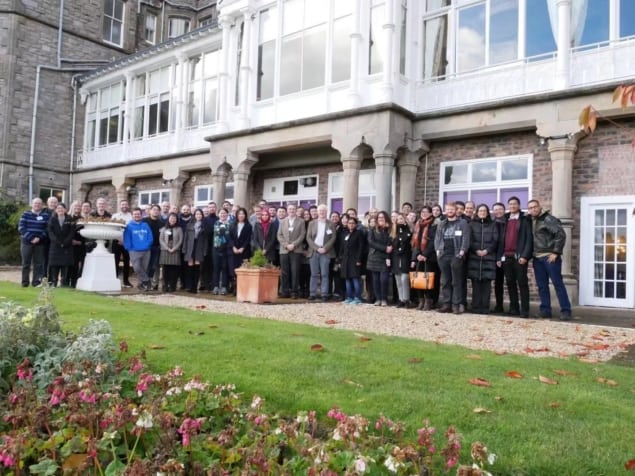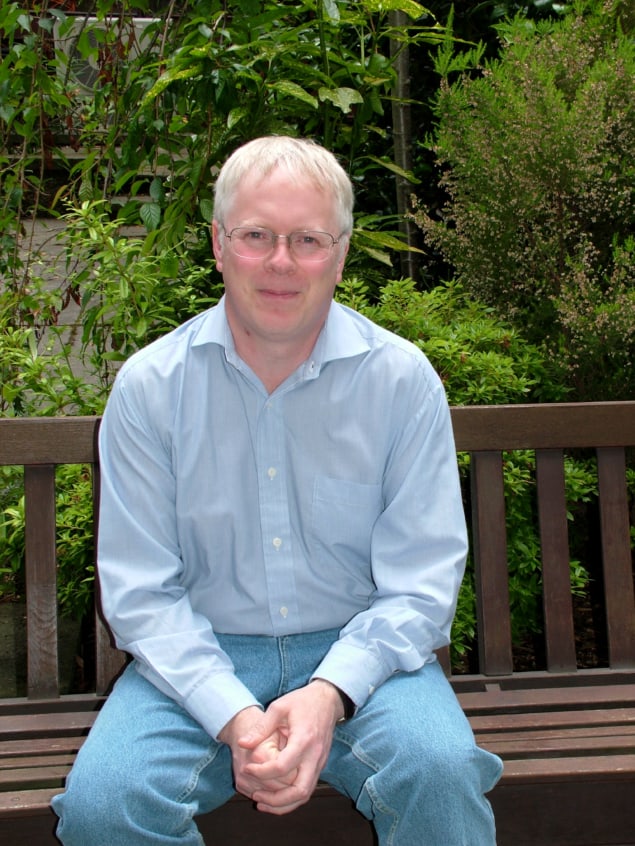
For John Irvine, energy and materials specialist at St Andrews University in Scotland, the path to solving our current climate and energy dilemmas originates in fundamental research, that is well-informed by technology needs and opportunities. Irvine has made a unique and highly significant contribution to the science of energy materials, especially fuel cell and energy conversion technologies. This research has ranged from detailed fundamental to strategic and applied science and has had major impact across academia, industry and government. His science is highly interdisciplinary extending from chemistry and materials through physics, bioenergy and engineering.
Irvine is bringing together academia and industry, and tackling the bureaucracy and biases of politics and government. I ask him what he loves about working in energy research, as well as his hopes for the future of the field.
How would you describe your current role or roles?
I guess I’m simply a professor in the energy field, doing research and some teaching – and quite a lot of leadership as well. My research group has quite a broad focus from ionic conductors through to fuel cells, batteries, photocatalysts, and bioenergy.
You’ve also been closely involved with industry?
I lead an Energy Materials Network that brings together UK researchers in the Materials for Energy domain, and an EPSRC project on emergent nanomaterials too. My work is also about translating science into useful engineering and applications, so we’re bringing communities together within Scotland and beyond.
I am quite proud of my role as one of the founders of the Scottish Hydrogen and Fuel Cell Association, which I chaired from 2007 to 2013. This brings together large and small industry, government and, even academia to deliver these important new technologies to society. Its aim is to promote hydrogen and fuel cells, with a sub theme to emphasize the use of renewables and bring renewables into the energy system. It is now one of the largest hydrogen fuel cell associations in the world.
How did you come to work in such a broad field of research, which straddles both academia and industry?
Being indecisive! I was never sure whether I was more of a chemist or a physicist, and then I became a material scientist. Now I’m slowly becoming an engineer. Being able to bring all my training together is quite a benefit, as all the fun stuff is at the interface.

Alliance with 2D materials boosts sulphur-based batteries
As for bringing together the academic and industry focus, we’re very lucky that our fundamental work impacts on industry – we’re in a really good place for translation of research into useful products. For a lot of big devices, the important technology is actually at the nanoscale and the interfaces. Take something like activation, where a physical or chemical process is triggered: If you engineer at the nanoscale you can actually improve performance by working on the interfaces between, say, the electrode and electrolyte. But you have to understand what’s going on at the nanoscale before you can apply that on a system scale.
Has it been difficult to work with both industry and academia?
No. It’s actually very useful to know what people want and what they need, because that can help you to think about what direction to take with the fundamentals. For example, our nanoparticle emergence work is growing catalysts at point of need, within a fuel cell. So rather than having catalysts in parts of the structure where you don’t need them, we actually discovered a way of growing them at the active point. We had to develop this thanks to a company that had a cell where we couldn’t access the active zone: the only way for us to do our chemistry, or to develop new materials solutions, was to produce nanoparticles in situ. So that’s a case where technology has driven us to some quite fundamental new physics.
What are some of the biggest challenges in your field today?
Although people talk about renewables as being unfairly favoured, fossil is ingrained in the structure of the modern world, and there is a lot of hidden support for it. If you want to change the industry system, people always compare it to the incumbent system and, of course, the incumbent system works rather well. So the status quo is quite difficult to overturn.
There’s also a lot of politics involved. Coming from Scotland, one could say that it’s quite shocking how England doesn’t want to have onshore wind farms, which may even be driving a lot of the energy policy. Whereas in Scotland, we’re very keen to have as much renewables as we can — and that’s just on this island.

So politics has a considerable impact on the renewable-energy industry?
Perhaps the challenge is more in government than politics. In industry, there’s rightfully a reluctance to try new technologies. If you’ve spent three years building a system on a certain chemistry, you won’t be in too big a rush to change it. You have to be grounded and realistic. It’s hard enough for new technologies, but if you look at solar photovoltaics, it’s really interesting how that’s come so far. There are some technical changes that we didn’t expect, but there are also major political implications, thanks to a lot of the technology being supplied by China. So we can get solar energy at a cost that is 10 times cheaper than we thought possible 10 years ago.
The other thing, of course, is that politicians are not so well-educated in science in this country, as maybe they should be. Other countries do have more science-based politicians, although it doesn’t always work in the science’s favour. I think that if politicians and policy-makers were a little bit more careful about their approach to science and technology, it would be quite beneficial.
Are there other skills or attributes, technical knowledge aside, that have been useful in getting you to where you are?
It’s good to have an open mind. Always try to understand what’s going on, because sometimes the most interesting things are those that you didn’t expect – you don’t want to miss the fun things because you had preconceptions. Often it is quite nice to be challenged – say, by students – with something that you didn’t expect because there’s very often another level of detail that one wasn’t aware of.
What part of your work do you enjoy the least?
Bureaucracy and ticking boxes. I’m much more pragmatic, if I can be. I probably spend too much time writing proposals too, like we all do. It seems quite inefficient, but one has to do it.
With all these different strands to your work how would a typical working day pan out for you?
I don’t know if there is a typical working day. It depends what I’m doing. I spend a lot of time travelling. We’ve got links with China, Korea, the US, Australia, India, and Europe. I could certainly have weeks where I’m mostly out of the office giving lectures and meeting people.
Will Brexit affect your work as a researcher?
It’s really good to be able to work with people with different backgrounds and cultures — it’s currently a real advantage of being a scientist. I think we’ve 14 nationalities in my group at present. I’m not looking forward to Brexit. Science brings people together and Brexit doesn’t. It’s going to make it more difficult and, at least in the short term, it could be more difficult to attract and retain people.
I’m Northern Irish, from the border, so I actually have very strong opinions on the matter. One thing about the Northern Irish is we’re very stubborn – for me it’s been very useful because I don’t give up easily, but who knows? Our stubbornness might actually work to our benefit this time and make Brexit essentially impossible, I live in hope.
What motivated you to become the inaugural editor-in-chief of Journal of Physics: Energy?
There are few, if any, journals in physics that really address energy, yet physics is absolutely core to the field. This journal is multidisciplinary, but it’s important it has a strong physics-base. I think it’s bringing fundamental science to play in real applications – a good opportunity to translate. I’d like to have good industry contributors so that businesses can have a chance to say what they want from the scientists.
Hopefully we can lead the way with new science and new directions in energy research. It’s quite easy to follow bandwagons and publish in areas where people are going to be cited a lot. We want to get a little ahead of the field. We still want a high impact factor, but if we can publish really good science that’s got important implications before it become a “hot topic” that everybody’s rushing to contribute to, that’s really important. My other reason for [taking on the role] is that IOP Publishing’s got a good platform and it’s a trustworthy publisher.
The journal is open-access: what’s your view on this kind of publishing?
There are a lot of open access journals that are out there to make profit rather than deliver science. I think this journal will not set profit above all other criteria, so if one’s going to get involved in an open access journal, this is a good base. I would say I’m a little bit nervous about open access. It’s obviously a very good idea but sometimes you could end up with pay-to-publish, and that’s something we don’t want to do in the Journal of Physics: Energy. Open access is a good thing to do, but just how we achieve it is difficult and I think journals like this probably are a good way forward.
What advice would you give to, an undergraduate who wanted to follow in your footsteps?
Obviously doing a PhD is the right way forward, to really understand what’s going on. But make sure to try and balance the PhD choice that has a good degree of science but also clear application. It doesn’t have to work out, but if you can’t see the possibility of applying what you’re doing, then it’s a weakness. You want to feel as though it’s productive.
- John Irvine is professor of energy and materials at St Andrews University in Scotland, and founding editor-in-chief of the recently launched Journal of Physics: Energy.
Bagikan Berita Ini















0 Response to "Fuelling the planet - physicsworld.com"
Post a Comment